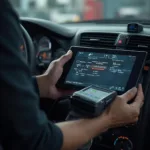OBD2 (On-Board Diagnostics 2) is a system found in most modern vehicles that helps diagnose car problems. One common question car owners have is, “does obd2 stored codes save information?” Understanding how OBD2 codes work and what information they store can be crucial for car maintenance and repairs.
Unraveling OBD2 Stored Codes
Your car’s computer, the Engine Control Unit (ECU), continuously monitors various systems and sensors. When it detects a malfunction, it generates a Diagnostic Trouble Code (DTC) or OBD2 code, which is then stored in its memory.
These codes act as breadcrumbs, indicating potential issues within your vehicle. But how long do these breadcrumbs stay?
How Long Are OBD2 Codes Stored?
This is where it gets interesting. There are two types of OBD2 codes, each with its own storage duration:
- Current Codes: These codes represent active problems detected during the current or last driving cycle. They are stored in the ECU’s memory until the issue is resolved, and the code is cleared.
- Pending Codes: These codes indicate intermittent or potential problems. The ECU flags these codes when a sensor reading falls outside the normal range but hasn’t yet triggered a full-blown issue. Pending codes might become current codes if the problem persists.
While the ECU stores these codes, it doesn’t mean they stay there indefinitely.
Factors Affecting OBD2 Code Storage
Several factors influence how long OBD2 codes are stored:
- Battery Disconnection: Disconnecting your car battery for a certain period can erase stored codes, both current and pending.
- Code Clearing: Using an OBD2 scanner tool or specific procedures can manually clear stored codes. Mechanics often do this after resolving the underlying issue.
- Vehicle Age and Model: Older vehicles might have limited storage capacity for OBD2 codes, potentially overwriting older codes with newer ones.
- ECU Type: Some advanced ECUs have more sophisticated memory management, allowing them to store codes and related data (freeze frame data) for longer durations and across multiple driving cycles.
The Value of OBD2 Code Information
Understanding what information OBD2 stored codes provide is key to leveraging their diagnostic power:
- Problem Identification: The codes themselves point to specific areas or components within your car’s systems that are malfunctioning.
- Troubleshooting: Mechanics use these codes as a starting point for diagnosing and troubleshooting car problems.
- Preventative Maintenance: Regularly checking for stored codes, even pending ones, can help identify potential issues early on, preventing costly repairs down the line.
Accessing OBD2 Stored Codes
While mechanics use professional-grade OBD2 scanners, affordable and user-friendly options are available for car owners. These scanners connect to your car’s OBD2 port and can retrieve and display stored codes.
However, simply reading the codes is often not enough.
Decoding the Information: Beyond the Code
Each OBD2 code is associated with a specific meaning. You can find comprehensive OBD2 code databases online, including our very own OBD2 DTC database, that provide detailed descriptions of each code.
For instance, the code P1131 OBD2 code indicates a problem with the “Lack of Upstream Heated Oxygen Sensor Switch Sensor 1 Bank 1,” which helps monitor and control the air-fuel mixture in your engine.
“Always remember that while the code itself provides a starting point, further diagnosis is usually needed to pinpoint the exact cause of the problem,” advises Jake Carter, a seasoned automotive diagnostician with over 15 years of experience.
OBD2 Codes: Your Car’s Language
Think of OBD2 stored codes as your car’s way of communicating with you. By understanding how these codes work, how long they are stored, and how to interpret their meaning, you gain valuable insights into your vehicle’s health.
Regularly checking and addressing OBD2 codes can empower you to address minor issues before they escalate into major problems, saving you time, money, and potential headaches down the road.
